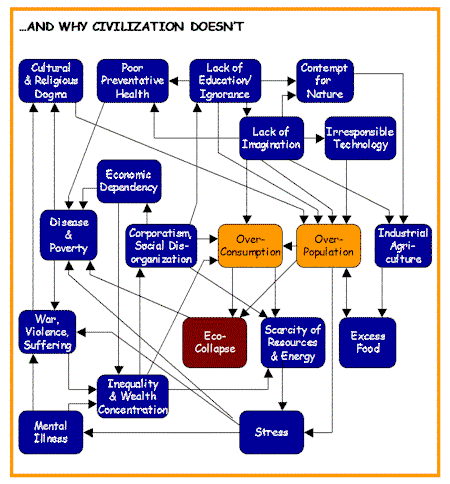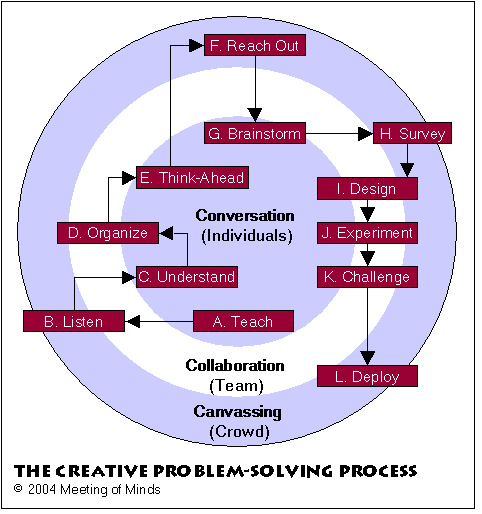 If you look at the lessons of history, it’s easy to conclude that:
Clay Christensen in The Innovator’s Dilemma explains that the undoing of most Fortune 500 companies has come about when new competitors unexpectedly began to devour their markets, sneaking up on them by stealth, often by accident, but always because of a new technology. And Bucky Fuller echoed this when he said that “You never change things by fighting the existing reality. To change something, build a new model that makes the existing model obsolete.” Could we apply these lessons to invent technologies that, like the technological inventions that ushered in the agricultural and industrial eras, might usher in a new, post-consumer, post-capitalist, post-corporatist, post-population-explosion, post-environmental-destruction human culture? That means giving up on attempts to bring about political, social, economic and educational reform, and instead focusing strictly on what Christensen calls ‘disruptive innovation’ and what technophile Fuller calls ‘a new model’, to undermine instead of trying to overcome the culture that threatens us all with catastrophic extinction. Some definitions are in order:
I have posited before that, as the systems thinking chart above illustrates, the two root causes of our culture’s destructiveness and unsustainability are overpopulation and overconsumption. It may seem crazy to think that we could invent some new, innovative technologies that, without any social, political, educational or economic help, would transform our culture (behaviour first, beliefs and values later) so dramatically that they would solve these huge, intractable problems. But imagine you were the inventor/discoverer of monoculture agriculture, showing the first few unbelievers of your new technologies that, after three million years of doing so, the only life they knew, they would never have to hunt or gather again? Or imagine you were the inventor of automation and the assembly line, trying to convince people that you can achieve orders-of-magnitude improvements in productivity by having people work in the service of machines? Both these improbable, radical new technologies succeeded quickly, ubiquitously, extraordinarily, in part because they were easy, the path of least resistance in very troubled times, and in part because people realized that there really was no other choice.
Well, maybe it is. But it seems to me foolish not to at least try. I don’t have all the answers, but I think I have the problem-solving process that could allow us, together, to find them. And I have some interesting ideas to get the process going. For example:
Well, you get the idea. I think my problem-solving process, applied to one problem at a time, and engaging as many people and as many ideas as possible, could work.
Imagine what we could accomplish together by learning, listening, understanding, organizing, thinking ahead, reaching out, brainstorming, designing, experimenting, challenging, and deploying collectively-developed solutions. We don’t need to get together physically to do this, and with the right preparation and the right team working on it, is there really any limit on what we might accomplish? |
Navigation
Collapsniks
Albert Bates (US)
Andrew Nikiforuk (CA)
Brutus (US)
Carolyn Baker (US)*
Catherine Ingram (US)
Chris Hedges (US)
Dahr Jamail (US)
Dean Spillane-Walker (US)*
Derrick Jensen (US)
Dougald & Paul (IE/SE)*
Erik Michaels (US)
Gail Tverberg (US)
Guy McPherson (US)
Honest Sorcerer
Janaia & Robin (US)*
Jem Bendell (UK)
Mari Werner
Michael Dowd (US)*
Nate Hagens (US)
Paul Heft (US)*
Post Carbon Inst. (US)
Resilience (US)
Richard Heinberg (US)
Robert Jensen (US)
Roy Scranton (US)
Sam Mitchell (US)
Tim Morgan (UK)
Tim Watkins (UK)
Umair Haque (UK)
William Rees (CA)
XrayMike (AU)
Radical Non-Duality
Tony Parsons
Jim Newman
Tim Cliss
Andreas Müller
Kenneth Madden
Emerson Lim
Nancy Neithercut
Rosemarijn Roes
Frank McCaughey
Clare Cherikoff
Ere Parek, Izzy Cloke, Zabi AmaniEssential Reading
Archive by Category
My Bio, Contact Info, Signature Posts
About the Author (2023)
My Circles
E-mail me
--- My Best 200 Posts, 2003-22 by category, from newest to oldest ---
Collapse Watch:
Hope — On the Balance of Probabilities
The Caste War for the Dregs
Recuperation, Accommodation, Resilience
How Do We Teach the Critical Skills
Collapse Not Apocalypse
Effective Activism
'Making Sense of the World' Reading List
Notes From the Rising Dark
What is Exponential Decay
Collapse: Slowly Then Suddenly
Slouching Towards Bethlehem
Making Sense of Who We Are
What Would Net-Zero Emissions Look Like?
Post Collapse with Michael Dowd (video)
Why Economic Collapse Will Precede Climate Collapse
Being Adaptable: A Reminder List
A Culture of Fear
What Will It Take?
A Future Without Us
Dean Walker Interview (video)
The Mushroom at the End of the World
What Would It Take To Live Sustainably?
The New Political Map (Poster)
Beyond Belief
Complexity and Collapse
Requiem for a Species
Civilization Disease
What a Desolated Earth Looks Like
If We Had a Better Story...
Giving Up on Environmentalism
The Hard Part is Finding People Who Care
Going Vegan
The Dark & Gathering Sameness of the World
The End of Philosophy
A Short History of Progress
The Boiling Frog
Our Culture / Ourselves:
A CoVid-19 Recap
What It Means to be Human
A Culture Built on Wrong Models
Understanding Conservatives
Our Unique Capacity for Hatred
Not Meant to Govern Each Other
The Humanist Trap
Credulous
Amazing What People Get Used To
My Reluctant Misanthropy
The Dawn of Everything
Species Shame
Why Misinformation Doesn't Work
The Lab-Leak Hypothesis
The Right to Die
CoVid-19: Go for Zero
Pollard's Laws
On Caste
The Process of Self-Organization
The Tragic Spread of Misinformation
A Better Way to Work
The Needs of the Moment
Ask Yourself This
What to Believe Now?
Rogue Primate
Conversation & Silence
The Language of Our Eyes
True Story
May I Ask a Question?
Cultural Acedia: When We Can No Longer Care
Useless Advice
Several Short Sentences About Learning
Why I Don't Want to Hear Your Story
A Harvest of Myths
The Qualities of a Great Story
The Trouble With Stories
A Model of Identity & Community
Not Ready to Do What's Needed
A Culture of Dependence
So What's Next
Ten Things to Do When You're Feeling Hopeless
No Use to the World Broken
Living in Another World
Does Language Restrict What We Can Think?
The Value of Conversation Manifesto Nobody Knows Anything
If I Only Had 37 Days
The Only Life We Know
A Long Way Down
No Noble Savages
Figments of Reality
Too Far Ahead
Learning From Nature
The Rogue Animal
How the World Really Works:
Making Sense of Scents
An Age of Wonder
The Truth About Ukraine
Navigating Complexity
The Supply Chain Problem
The Promise of Dialogue
Too Dumb to Take Care of Ourselves
Extinction Capitalism
Homeless
Republicans Slide Into Fascism
All the Things I Was Wrong About
Several Short Sentences About Sharks
How Change Happens
What's the Best Possible Outcome?
The Perpetual Growth Machine
We Make Zero
How Long We've Been Around (graphic)
If You Wanted to Sabotage the Elections
Collective Intelligence & Complexity
Ten Things I Wish I'd Learned Earlier
The Problem With Systems
Against Hope (Video)
The Admission of Necessary Ignorance
Several Short Sentences About Jellyfish
Loren Eiseley, in Verse
A Synopsis of 'Finding the Sweet Spot'
Learning from Indigenous Cultures
The Gift Economy
The Job of the Media
The Wal-Mart Dilemma
The Illusion of the Separate Self, and Free Will:
No Free Will, No Freedom
The Other Side of 'No Me'
This Body Takes Me For a Walk
The Only One Who Really Knew Me
No Free Will — Fightin' Words
The Paradox of the Self
A Radical Non-Duality FAQ
What We Think We Know
Bark Bark Bark Bark Bark Bark Bark
Healing From Ourselves
The Entanglement Hypothesis
Nothing Needs to Happen
Nothing to Say About This
What I Wanted to Believe
A Continuous Reassemblage of Meaning
No Choice But to Misbehave
What's Apparently Happening
A Different Kind of Animal
Happy Now?
This Creature
Did Early Humans Have Selves?
Nothing On Offer Here
Even Simpler and More Hopeless Than That
Glimpses
How Our Bodies Sense the World
Fragments
What Happens in Vagus
We Have No Choice
Never Comfortable in the Skin of Self
Letting Go of the Story of Me
All There Is, Is This
A Theory of No Mind
Creative Works:
Mindful Wanderings (Reflections) (Archive)
A Prayer to No One
Frogs' Hollow (Short Story)
We Do What We Do (Poem)
Negative Assertions (Poem)
Reminder (Short Story)
A Canadian Sorry (Satire)
Under No Illusions (Short Story)
The Ever-Stranger (Poem)
The Fortune Teller (Short Story)
Non-Duality Dude (Play)
Your Self: An Owner's Manual (Satire)
All the Things I Thought I Knew (Short Story)
On the Shoulders of Giants (Short Story)
Improv (Poem)
Calling the Cage Freedom (Short Story)
Rune (Poem)
Only This (Poem)
The Other Extinction (Short Story)
Invisible (Poem)
Disruption (Short Story)
A Thought-Less Experiment (Poem)
Speaking Grosbeak (Short Story)
The Only Way There (Short Story)
The Wild Man (Short Story)
Flywheel (Short Story)
The Opposite of Presence (Satire)
How to Make Love Last (Poem)
The Horses' Bodies (Poem)
Enough (Lament)
Distracted (Short Story)
Worse, Still (Poem)
Conjurer (Satire)
A Conversation (Short Story)
Farewell to Albion (Poem)
My Other Sites






Intersting essay, Dave. Why don’t you suggest one topic, lay out a few ground rules and expectations, and invite the blogosphere to brainstorm on it?
Karen: You guessed my plan, exactly. I was going to do exactly that, next week. I wanted to give people a few days to mull it over, and see if anyone wanted to tweak the process or suggest groundrules, or propose a first topic. My reader ‘Dilys C’ thinks it could be done as an online conference, with some proper prep. I think we should start small, figure out what works, and compare notes before we try to scale it up.
I have been reading this site for a bit and have found it as a good feed for important information. I am working on a project that involves mindmapping and collaboration. I am attempting to create a process where people would no longer blog in the traditional sense. Rather they would create structures of truth and describe properties and objects. By visualizing concepts and relations a better understanding of the whole can be had. Do you live in Toronto? The problem with my work is that no one around me understands it and I need someone to talk to about this.
Reader Steven Hill is getting blocked from commenting, presumably because of new Radio Userland policy requiring commenters’ ISPs to dovulge the sender’s IP Address (a spam blocking device that several readers are struggling with). He says:Interesting post. How about setting up a wiki where anyone interested could brainstorm this stuff. Happy to track down a hosted wiki service and start the ball rolling (and of course contribute).My reply: I’ve received several good ideas like this on Next Steps for this idea. I’ll be a doing a follow-up post next week.